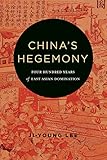China's Hegemony : Four Hundred Years of East Asian Domination / Ji-young Lee.
Material type: TextPublisher: New York, NY : Columbia University Press, [2016]Copyright date: ©2016Description: 1 online resource (304 p.)Content type:
TextPublisher: New York, NY : Columbia University Press, [2016]Copyright date: ©2016Description: 1 online resource (304 p.)Content type: - 9780231179744
- 9780231542173
- 327.5105 23
- DS518.15 .L44 2016
- online - DeGruyter
- Issued also in print.
| Item type | Current library | Call number | URL | Status | Notes | Barcode | |
|---|---|---|---|---|---|---|---|
 eBook
eBook
|
Biblioteca "Angelicum" Pont. Univ. S.Tommaso d'Aquino Nuvola online | online - DeGruyter (Browse shelf(Opens below)) | Online access | Not for loan (Accesso limitato) | Accesso per gli utenti autorizzati / Access for authorized users | (dgr)9780231542173 |
Browsing Biblioteca "Angelicum" Pont. Univ. S.Tommaso d'Aquino shelves, Shelving location: Nuvola online Close shelf browser (Hides shelf browser)

|

|

|

|

|

|

|
||
| online - DeGruyter The Miracle Myth : Why Belief in the Resurrection and the Supernatural Is Unjustified / | online - DeGruyter A Dharma Reader : Classical Indian Law / | online - DeGruyter The Shenzi Fragments : A Philosophical Analysis and Translation / | online - DeGruyter China's Hegemony : Four Hundred Years of East Asian Domination / | online - DeGruyter Capitalism and Desire : The Psychic Cost of Free Markets / | online - DeGruyter The First Modern Japanese : The Life of Ishikawa Takuboku / | online - DeGruyter Heidegger : His Life and His Philosophy / |
Frontmatter -- Contents -- Acknowledgments -- Introduction -- 1. Understand the Tribute System -- 2. Chinese Hegemonic Authority -- 3. The Making of Ming Hegemony -- 4. The Imjin War (1592-1598) -- 5. The Making of Qing Hegemony -- Conclusion -- Notes -- Bibliography -- Index
restricted access online access with authorization star
http://purl.org/coar/access_right/c_16ec
Many have viewed the tribute system as China's tool for projecting its power and influence in East Asia, treating other actors as passive recipients of Chinese domination. China's Hegemony sheds new light on this system and shows that the international order of Asia's past was not as Sinocentric as conventional wisdom suggests. Instead, throughout the early modern period, Chinese hegemony was accepted, defied, and challenged by its East Asian neighbors at different times, depending on these leaders' strategies for legitimacy among their populations. This book demonstrates that Chinese hegemony and hierarchy were not just an outcome of China's military power or Confucian culture but were constructed while interacting with other, less powerful actors' domestic political needs, especially in conjunction with internal power struggles.Focusing on China-Korea-Japan dynamics of East Asian international politics during the Ming and High Qing periods, Ji-Young Lee draws on extensive research of East Asian language sources, including records written by Chinese and Korean tributary envoys. She offers fascinating and rich details of war and peace in Asian international relations, addressing questions such as: why Japan invaded Korea and fought a major war against the Sino-Korean coalition in the late sixteenth century; why Korea attempted to strike at the Ming empire militarily in the late fourteenth century; and how Japan created a miniature tributary order posing as the center of Asia in lieu of the Qing empire in the seventeenth century. By exploring these questions, Lee's in-depth study speaks directly to general international relations literature and concludes that hegemony in Asia was a domestic, as well as an international phenomenon with profound implications for the contemporary era.
Issued also in print.
Mode of access: Internet via World Wide Web.
In English.
Description based on online resource; title from PDF title page (publisher's Web site, viewed 02. Mrz 2022)


